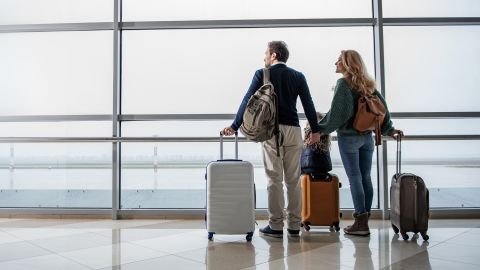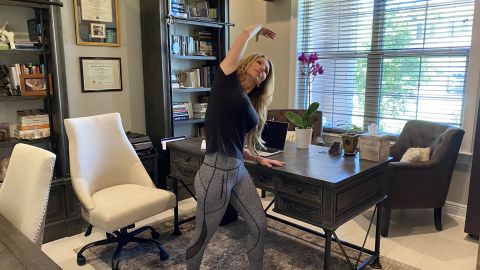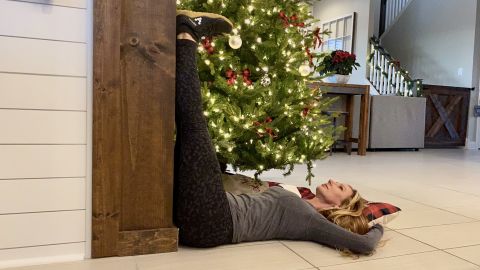Editor’s note: Dana Santas, known as the “Mobility Maker,” is a Certified Strength and Conditioning Specialist and Mind-Body Coach in professional sports, and is the author of “Practical Solutions for Back Pain Relief.”
CNN
—
For many people, traveling is a necessary part of celebrating the holidays with loved ones. This means enduring all of the stressful setbacks that can come with traveling and spending time away from the comforts of your own home.
Every year my family kicks off the season by watching the classic comedy “Planes, Trains and Automobiles” starring Steve Martin and the late John Candy. In it, the two men are strangers who end up together, dealing with a comically excessive amount of travel-related issues as they try to get home for Thanksgiving.
Your vacation trip will most likely not be as complicated as Martin and Candy’s, but you may face delays, diversions, and long hours of sitting that can take a toll on you mentally and physically. So, whether you’re driving to Grandma’s house for Thanksgiving or flying to see family in another country, try the five tips below to reduce stress and tension so you can enjoy life. parties.
When you sit for long periods while traveling, your posture often suffers. Given the intimate relationship between your breathing pattern and your posture, slouching while sitting leads to shallow, rapid breathing, inciting your body’s stress response. It is a vicious circle that increases physical and mental tension.
That’s why it’s important to take control of your breathing at least once an hour while traveling to help restore your posture and cultivate a sense of calm. Taking just five or six long, deep breaths while focusing on getting your lower ribs moving as shown in this video can make a world of difference!

Optimize your breathing with these tips
03:08
– Source: CNN
Just 90 seconds of deep breathing elicits a relaxation response that lowers heart rate, blood pressure, and stress hormone production, according to research.
Those muscle cramps and joint pain you experience on the road can have a lot to do with your fluid intake. Given that our bodies are mostly water, hydration is important for proper joint lubrication and circulation. But your hydration level doesn’t just affect you physically. When you’re dehydrated, your body’s cortisol (primary stress hormone) levels rise, which can lead to feelings of anxiety, exhaustion, and general irritability.

Your access to drinking water may be limited while traveling, so it’s important to plan ahead. You can’t bring bottled water through Transportation Security Administration checkpoints, and no one likes paying exorbitant prices for bottled water at the airport. Fortunately, most airports have filtered water stations to refill bottles for free. So pack a reusable water bottle, and if you’re driving, don’t forget to pack a cooler of water.
Even when you’re not traveling, vacations make it easy to get dehydrated. With all the festivities, we often forget to drink as much water as usual, especially when the cocktails are flowing. But alcoholic beverages are not a substitute for water because they dehydrate.
Alcohol suppresses the natural production of the antidiuretic hormone vasopressin, which prevents us from urinating too much. Without it, we find ourselves in the bathroom more often. Counteract the dehydrating effect of alcohol by drinking a glass of water per cocktail.
Studies on the health dangers of prolonged sitting abound, but few people seem to make an effort to avoid it while traveling. Looking around the airport, you’ll find almost everyone sitting at the gate waiting to board their plane, where they will inevitably sit for at least a couple of hours or more.
Interrupt sitting episodes by taking opportunities to stand and walk whenever possible. At the airport, take a walk through your terminal. Some airports even have yoga rooms with public access. When traveling by car, find a park or even a shopping center on your route where you can get out and take a 10-minute walk.
Spending a lot of time sitting during travel also means compression of the lateral waist muscles, overused hip flexors, and tight muscles in the lower back. If you want to be more comfortable and avoid pain when traveling, you should stretch those muscles whenever possible.
My favorite travel stretch is the warrior hip flexor release.

Here is how to do it:
Stand to the right of a wall, chair, or other stable surface. Place your left hand on it for support.
Step your right foot back into a short lunge position, dropping your back heel and pointing your toes slightly, as shown.
Bend the front knee to align it above the ankle, while the back leg stays straight.
Inhale as you raise your right arm above your head.
Exhale as you lean to the left, feeling the lower left ribs turn inward.
Avoid arching your lower back.
Hold the position for three long, deep breaths. Repeat on the other side.
Watch the video at the top of this story for more exercises to combat the negative impact of sitting.
You may be so relieved to arrive at your destination that you think that flopping into a comfortable chair is all you need. But it’s even more beneficial to raise your legs above your heart, which promotes venous blood flow and helps reduce lower-body swelling.

A great way to accomplish this is with the popular restorative yoga pose known as “legs on the wall.” You can do this on the floor with your legs stretched out against a wall, or with your knees bent and your calves resting on the seat of a chair. If you don’t want to lie on the floor, you can lie on your back on the bed and put your legs over the headboard. Feel free to put a pillow or folded blanket under your head.
Once in the position, stay there for a few minutes, taking a few deep, relaxing breaths.
In addition to changing your relationship with gravity to relieve stress, it’s important to get enough sleep. This is especially true if you have traveled to a different time zone. Work on naps, if necessary, to make up for any sleep deficits that may negatively affect your health and well-being.
Despite all the joys that the holidays bring, it’s important not to overlook the ways that seasonal travel can inadvertently drag you down. Using the five tips above will help keep the stress of the trip at bay and keep the holiday spirit high.
Source: news.google.com